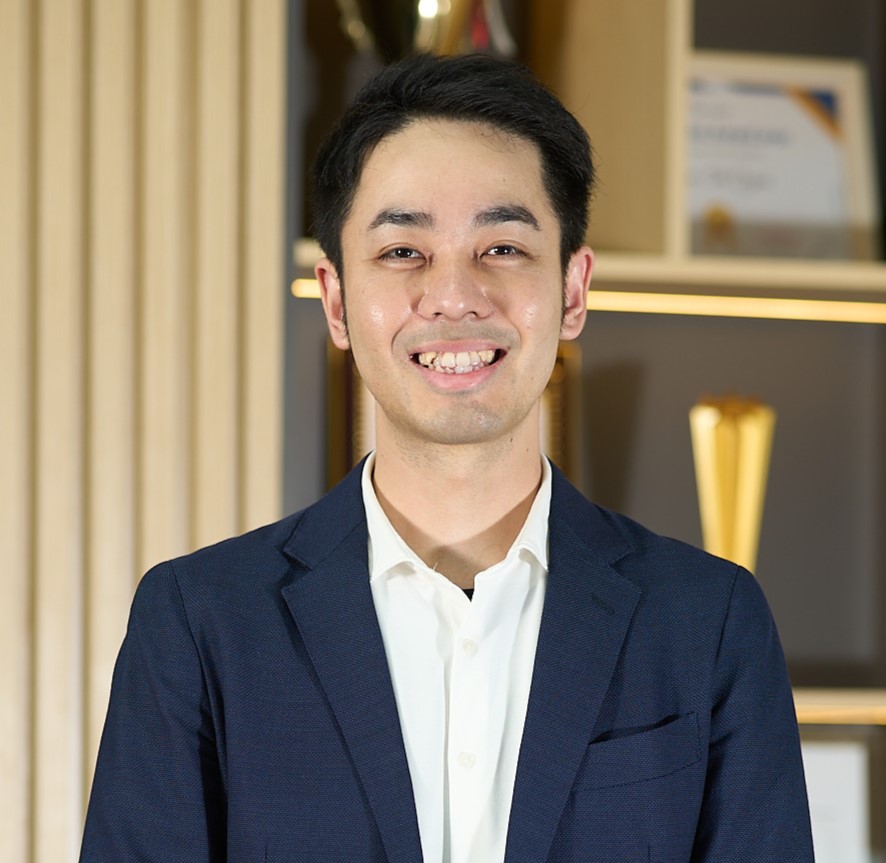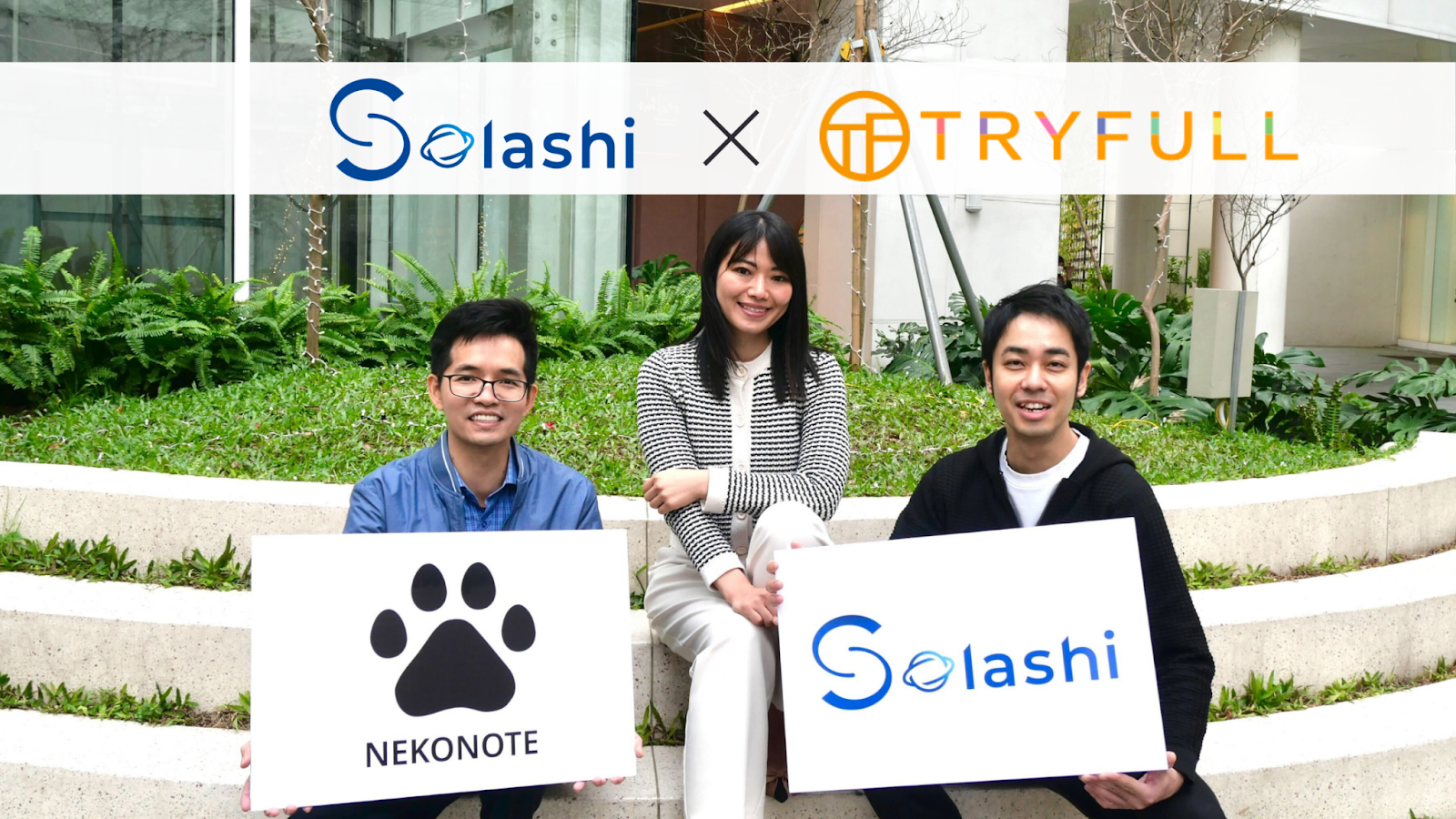The company Tryfull, which runs the foreign-language staffing and corporate matching app NEKONOTE had been focusing on efficiency and cost reduction for app development but faced difficulties as they couldn’t find a good development company. In order to overcome this situation and create a better app and service, they decided to outsource to Solashi. Today, we talk to Kuno, the CEO of Tryfull, about “what the requesting side should be conscious of to create better products.”
Developing the Foreign-Language Staffing and Corporate Matching App “NEKONOTE” In-House
Q: Can you introduce Tryfull’s business first?
Kuno: Tryfull operates the foreign-language staffing and corporate matching app NEKONOTE. Due to the recent increase in inbound demand, exhibition halls and events now require foreign-language support. In such a context, NEKONOTE allows for easy ordering of event staff, interpreters, and companions who can handle language needs. You can order the required personnel for as low as 20,000 yen per day, and workers are paid more than 15,000 yen per day, offering high compensation, which is gaining attention in the industry as an innovative approach.
Q: Could you tell us about the background and circumstances behind launching your business?
Kuno: I myself have traveled to 51 countries as a backpacker and interacted with people from nearly 100 nationalities, which serves as the background. Many of the people I met had excellent language skills but were not able to utilize them in their work.
On the other hand, I also have about five years of experience working in the event industry, where I took on foreign-language related jobs. At that time, I experienced a system where my abilities and achievements were fairly evaluated for each project, and I was paid accordingly. I thought, “If this system spreads, I can solve the issues I’ve felt,” and that’s when I decided to establish this business.
I started by creating a group on LINE, developed the website, logo, and operational systems on my own. After about six months, the business grew enough to be commercialized, which led to the development of our own app.
Q: So it all started with a LINE group. When did you first have the idea to develop an app?
Kuno: The idea of creating an app existed from the beginning. When we started with the LINE group, we had about 20 people, but by the time we turned it into a business, the number grew to several hundred. We reached a point where we couldn’t keep up with the demand without systematizing, which was a major factor in moving towards app development.
We also hoped to streamline operations through app development. The event staffing business involves a lot of complicated tasks, and there are many intermediaries, which leads to high intermediary fees. By automating the process through an app and directly matching clients with staff, we can reduce operational costs and eliminate intermediaries.
As a result, NEKONOTE has managed to offer lower commission rates compared to other companies and ensure that workers (whom we call ‘casts’) receive higher compensation.
The First Company Was Unresponsive, the Second Felt Lacking Passion, and We Found Solashi on the Third Try
Q: So you decided to pursue app development as a way to automate and systematize your operations.
Kuno: That’s right. By the second year of the business, I started working on app development. However, I couldn’t find a good development company. The first company failed to create a proper app, and the team changed twice, eventually going silent. The second company produced a reasonably good product, but I could feel a lack of passion for the project; it felt like they were just making it because they were asked to. We met Solashi with the third company.
In my previous job as a web marketer, I was involved in app development. At that time, the developers worked on-site and understood our business. Moreover, we learned how to build websites through training, and we were able to communicate closely while bridging our areas of expertise. Until I met Solashi, I honestly didn’t realize how difficult app development could be.
Shimazoe: The event industry and foreign-language related work are areas that are very hard for system engineers to imagine. We happened to exhibit at a trade show just before taking on this project, which allowed us to experience the client’s perspective and gain insights. If we had approached it with a blank slate, it would have been difficult to understand the foreign-language staffing business.
Q: How did you come to work with Solashi?
Kuno: Shimazoe and I are alumni from the same university, and we reconnected at a reunion. Four years later, I received a friend request from Shimazoe on Facebook, and that’s when I learned that they were working on app development. At the time, we were deciding whether to switch development companies or develop it in-house. So I reached out to them to hear their thoughts.
Shimazoe: When I listened to the business, I could sense that there were various challenges. Development is simply a means of problem-solving, and to solve the problem, we need to understand it properly. So, we first focused on aligning on the company’s challenges and the direction of solutions.
Supporting Broader Issues like Subsidy Applications and Funding
Q: At the time, were there other challenges you were facing beyond app development?
Kuno: Yes, we also discussed internal operational improvements due to the challenging market conditions. As a result, not only did we request the app development, but we also asked for help with website creation and overall internal system development. What ultimately convinced me to work with Solashi was their commitment to understanding our business.
I felt the same level of commitment from the Vietnamese staff working as testers and communicators. When I visited Vietnam, a communicator said that they wanted to promote NEKONOTE, and that was greatly appreciated. Such a mindset helps drive motivation to create something good.
Their proactive approach to identifying gaps in the specifications and proposing improvements was also very valuable. In many cases with other development companies, those gaps were left unaddressed, but Solashi thoughtfully worked through them, which was a big help.
Q: What efforts have you made to motivate the development team at Solashi?
Shimazoe: During onboarding and kick-off, I made sure to incorporate images and visuals to convey the real-life experience. Since Vietnamese engineers and designers do not have the opportunity to attend Japanese trade shows, it was challenging to provide them with sufficient information about the specific workflow.
One of the key factors behind the team’s high level of commitment was that their professionalism was stimulated. When they saw the source code of the app created by the previous development company, they focused on achieving a beautiful UI and improving performance. By sharing the on-site experience and the challenges we were facing, the engineers became motivated to work autonomously. Unexpectedly, their professionalism contributed to the success of this project.
Q: In this project, you provided not only app development but also extensive support for business challenges.
Shimazoe: Previously, they paid the development company directly for their services. However, in this project, we discovered that it was eligible for manufacturing subsidies. We began by introducing a company that could assist with subsidy applications, then we worked on creating a future roadmap, organizing the requirements, and conducting interviews with the operations team. Given the company’s economic situation, we were able to propose a way to move forward with what they wanted to achieve despite not having full progress.
Kuno: The support we received regarding subsidies was particularly helpful. I had previously applied for a subsidy but was not selected, so this time, with your help, we were able to secure enough budget to develop what we wanted. It wasn’t just about app development—having support for the broader aspects of our business was incredibly helpful.
The better products are created when both the client and the development side understand each other’s business.
Q: What do you think is key to creating a successful project?。
Kuno: I feel that it’s important for both the client and the developer to meet each other halfway. In my previous job, I had a bad experience where the client did not understand the developer’s workload, which led to friction with the development company. In reality, it can be difficult for developers to express how much burden they are under.
In our business, the clients we consider good are those who prepare meals for the cast or offer changing spaces, making it easier for people to work. Similarly, in app development, we need to create an environment where developers can work comfortably by listening to their feedback and finding ways to meet halfway. Just as you would use user interviews to understand customer needs, it’s also important to create opportunities for mutual understanding with developers.
From my previous bitter experience, I’ve learned that when creating something, it’s crucial to work together as a team. Understanding each other’s perspectives is important, whether for events or apps. For example, sometimes there are gaps in the system based on the specifications we provide. If the actual business flow is not understood, it can be difficult to spot these issues in the system.
If the client doesn’t understand development, there’s a risk of giving misguided instructions. By exploring ways to simplify implementation or solving problems using the operational rules rather than the app’s specifications, both the business side and the development side can better understand each other’s domains and find the best solutions.
Q: Finally, can you tell us about your future plans?
Kuno: Right now, our business is about to expand. The market is improving, and we expect an increase in inbound demand, with inquiries rising. As we expand, we need to maintain the quality of our services while continuing to refine and improve our app and website.
Supervisor Profile

Akira Shimazoe
Representative of Solashi Japan LLC. Born in April 1989 in Fukuoka Prefecture. Graduated from the Graduate School of Information and Mathematical Sciences at Osaka Prefecture University. Joined Suntory System Technology Co., Ltd., an IT subsidiary of Suntory Holdings, in 2014. Broadly responsible for the development, operation, and implementation of vending machine delivery management, efficiency improvements, and sales management systems. Founded Yper Inc. in 2017, serving as CTO and CPO. Contributed to the launch and growth of the app-linked delivery bag "OKIPPA." Selected for Toyo Keizai's prestigious "Amazing Venture 100" and Forbes' "Forbes 30 Under 30 Asia 2019."

 日本語
日本語
